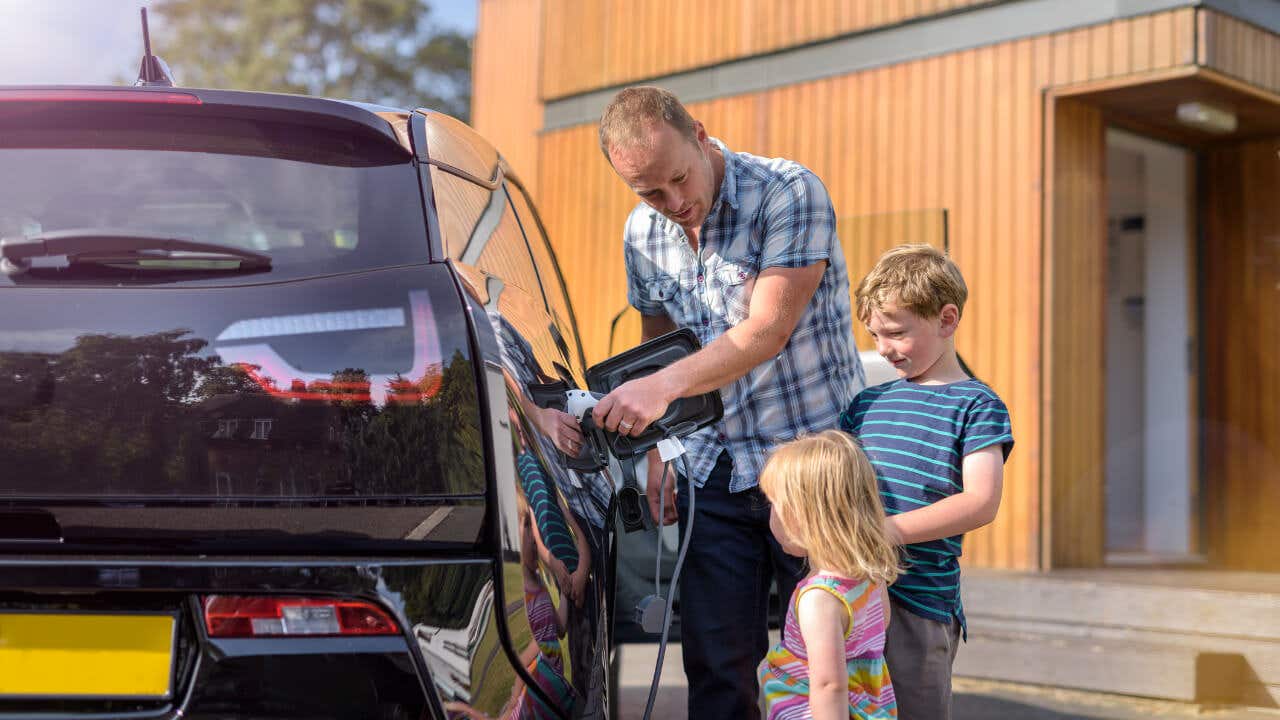2024 EV tax credits: How to finance your EV charger

Key takeaways
- EV tax credits are credits you receive when you file your income taxes that can offset the cost of purchasing and owning an electric vehicle.
- Some EV tax credits apply specifically to the purchase and installation of home EV chargers.
- You may be able to receive other tax credits or incentives from your utility company or your state for installing an EV charger at home.
With car manufacturers providing more and more electric vehicle options, you may be wondering if switching to an EV is the right choice for you. If so, you are not alone. According to a study by Pew Research Center, three out of 10 Americans are at least somewhat likely to consider purchasing an electric vehicle.
Several green tax credits can help to offset your costs. There’s even a federal credit specifically for purchasing and installing an EV charger in your home. Check out Bankrate’s EV credit guide to learn more about other tax credits available to you.
How to use the EV charger tax credit for home charging stations
One of the major changes that came with the updated Inflation Reduction Act allows drivers to use the tax credit to help finance a vehicle charger. Its official name is the Alternative Fuel Vehicle Refueling Property Credit. To claim the credit, EV drivers must file Form 8911 with the IRS. Save your receipts related to the EV charger installation, as you’ll need those to file.
You don’t get the credit automatically when you purchase an EV charger — you must submit income and state information when you file taxes to benefit. It is also important to remember that the credit is not cash you receive. Instead, the credit is subtracted from the federal taxes you owe the year after you buy the charger.
What’s new with the credit?
Liz Najman, director of market insights at Recurrent Auto, explained the details of the updated credit.
The legislation has renewed existing credits for residential chargers through 2032, says Najman. With less of a time crunch for drivers, now could be a good time to consider exploring an electric vehicle for your next set of wheels.
The renewed credit most notably can be used to finance 30 percent or up to $1,000 — whichever is smaller — of the cost to purchase and install home charging.
What’s new Najman says, is that “bidirectional charging equipment, which lets you power your home or appliances with your electric car, is now included.” Such equipment is pricey. Installing both the Ford Charge Station Pro and the Home Integration system for the Ford F-150 Lightning can cost anywhere from $10,150 to $11,050.
The credit also comes with some other stipulations. For instance, Najman says the refueling property must be in an eligible, low-income or non-urban census tract. You can find out if you’re eligible by using the Argonne National Laboratory mapping tool.
Do you need a home charger?
While a home charger isn’t cheap, this credit does sweeten the deal when it comes to buying and driving electric. But, advises Najman, “not everyone necessarily needs to install fancy equipment to drive an EV.”
“Many drivers with short daily commutes are perfectly satisfied using the 120V cable that comes with the car and can be plugged into a standard outlet,” she adds.
Consider checking out Recurrent’s guide to home charging setup when deciding if a home charger is right for you.
You may qualify for the EV charger credit when you file your taxes in 2025 if you purchased, installed and began using an EV charger at your residence during the most recent tax year.
How does an at-home charger impact your energy bill?
Installing an at-home charger will have an impact on your energy bill, explains Najman, but the exact cost varies.
The additional cost “depends on your utility plan, what equipment you install, what car you drive, and how much you drive it,” says Najman. But for most drivers, the extra cost “is far less than the cost of gasoline to fill the tank of a conventional vehicle, so you will save money.”
Additionally, most utility companies offer programs to help lower the cost of vehicle charging, as outlined in Recurrent’s electric bill guide.
Other EV charger incentives and rebates
Outside of nationwide incentives offered through the Inflation Reduction Act, there are other ways to save money on charger installations. Check out state and municipal incentives that can help lower the cost of owning an EV.
State and utility EV tax credits and incentives
Check out available incentives in your state before deciding to buy electric. Colorado, Connecticut and Delaware lead with the highest tax rebates. Maryland, California and Massachusetts follow close behind.
Biden’s infrastructure law and federal EV charger tax credit to expand access
Initiatives outlined in President Joe Biden’s Bipartisan Infrastructure Law show his administration’s focus on electric vehicle expansion.
“President Biden’s Bipartisan Infrastructure Law invests $7.5 billion in EV charging, $10 billion in clean transportation, and over $7 billion in EV battery components, critical minerals, and materials,” shared a White House brief following the announcement of the law.
“These flagship programs complement the Inflation Reduction Act’s landmark support for advanced batteries and new and expanded tax credits for purchases of EVs and to support installations of charging infrastructure,” the White House stated.
The programs work in tandem with “dozens of other federal initiatives designed to drive domestic manufacturing and build a national network of EV charging.”
One especially encouraging update to the incentive helps make EV chargers more accessible for commercial use. The tax credit for commercial entities now can be used for up to $100,000 or 30 percent per unit. This is quite the jump from the previous $30,000 maximum per property.
This big increase, explains Najman, “means that commercial properties have way more incentive to install fast, reliable chargers.”
How to secure the best EV auto loan
The choice to purchase an electric vehicle requires some reflection on need, budget and access to chargers. But as tax incentives have expanded over the recent years, now could be a good time to explore EV options. Select auto loan lenders — including Tenet, for example — cater to those looking to finance an EV with special rate discounts or other perks.
Bottom line
Although EVs and their chargers can come at a steep cost, tax credits and incentives can help ease that burden. The EV charger tax credit can help taxpayers access up to $1,000 in tax credits or 30 percent of the charger costs, whichever amount comes out smaller. If the costs of owning an EV seem too steep, you could also look into leasing an EV.






